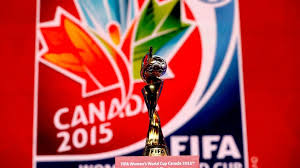By Andrew Warshaw
June 30 – With the women’s World Cup reaching the semi-final stage today and tomorrow, questions are being asked about why the top two countries in the world ended up being in the same half of the draw.
Whilst the mouth-watering clash between Germany and the United States promises to be highlight of the tournament, many are wondering why FIFA didn’t ensure they were kept apart. And why France, the world’s third-ranked team and arguably the best performers in the competition, had to play Germany as early as the last eight.
It would appear that filling the stadiums for the purposes of prime-time television appears to have taken precedence over competitive fairness.
The fact is that FIFA decided to assign the seeded teams to groups before the draw unlike the random way men’s seeds are groups. This pretty much ensured – as long as matches went according to form – who would meet each other at which stage. The idea was presumably to set up a final between the United States and Canada – the two countries who had bought the most tickets – but that plan went up in smoke when the host nation were eliminated by England.
No disrespect to Japan and England, who meet in the other semi-final, but most neutral fans would have relished a Germany-USA final. Even a France-USA final, for that matter.
“I’m sorry, but if they did a real draw, maybe we would not have played Germany or the United States afterwards,” bemoaned France’s Camile Abily in the wake of her country’s unfortunate quarter-final penalty shootout defeat to the Germans. Referring to Germany’s more or less pre-planned semi-final matchup, she added: “Inevitably, it’s frustrating even if we knew this from the start. Why don’t we do it like the men? At some point they have to stop taking us for idiots.”
Quoted by Sports Illustrated, a FIFA spokesperson said: “Similar to previous draws for FIFA Women’s World Cups like Germany in 2011, teams are seeded … and allocated into specific groups for ticketing and promotion reasons. Whilst the interest in the FIFA Women’s World Cup has grown significantly over the last years, the success and great interest from the public in the tournament in Germany in 2011 can’t be compared to the Brazil [men’s] World Cup. Filling the stadia is a FIFA and host association key objective. The allocation of teams to venues, the ticketing and promotion plan and the ticket price strategy are among the key factors for the overall success of the event.”
Whilst on the one hand promoting the women’s game has to be a healthy exercise, critics might argue that this is another example of female players being treated with inferiority to the men following the furore of being forced to play on artificial turf instead of natural grass.
Whilst all World Cups fall somewhat flat once the host nation has been eliminated, the US-Germany match represents the clash of the titans, with the winners up against either defending champions Japan or outsiders England in the final at the weekend.
The two sides have met three times before in World Cups with the Americans coming out on top in 1991 and 1999. However, the most recent meeting, in 2003, went the way of Germany 3-0. Silvia Neid’s side will be hoping for a similar performance in Montreal tonight to reach the final for the first time since they won the competition in 2007 and to make up for a humiliating exit in the quarter-finals on home soil four years ago.
The Americans will be just as hungry, however, having failed to lift the trophy since 1999, losing on penalties to Japan four years ago.
Wednesday’s other semi-final has generated unprecedented interest in England where the women’s game receives scant national media coverage, let alone back page headlines. Millions stayed up until the early hours to watch the 2-1 win over Canada that sent the English into the semis for the first time ever and brought the fast-growing sport to a whole new audience that traditionally feasts on the men’s game, in particular the Premier League.
Contact the writer of this story at moc.l1751316294labto1751316294ofdlr1751316294owedi1751316294sni@w1751316294ahsra1751316294w.wer1751316294dna1751316294

